|
|
|
Sort Order |
|
|
|
Items / Page
|
|
|
|
|
|
|
| Srl | Item |
| 1 |
ID:
168914


|
|
|
|
|
| Summary/Abstract |
NGOs have been seen as an integral part of civil society and a necessary feature of democratic transition. It has been argued that depoliticised NGOs in China ‘embedded’ in existing political structures would eventually bring about democratic changes through incremental actions, as they did in post-Soviet Russia. Both countries, however, recently witnessed the shrinking of political and legal space for public participation, especially for foreign-funded civil society organisations. This article analyses the impact of the NGO laws on civil society in Russia and China to update the embedded activism hypothesis. It draws on empirical data to describe the strategies that the NGOs use to adapt and how the future of the sector is perceived by young people in both countries.
|
|
|
|
|
|
|
|
|
|
|
|
|
|
|
|
| 2 |
ID:
151461


|
|
|
|
|
| Summary/Abstract |
The different agreements on oil and natural gas signed by Russian and Chinese companies testify to the profound changes in the oil and gas policies of both Russia and China. We stress the importance of the contractual norms which structure the energy interdependency of the countries involved. As there is no international multilateral framework able to manage energy supply security, the way the countries involved construct their energy interdependence to an extent defines models of sectoral governance.
|
|
|
|
|
|
|
|
|
|
|
|
|
|
|
|
| 3 |
ID:
185574


|
|
|
|
|
| Summary/Abstract |
This article contributes to the understanding of authoritarian states as norm entrepreneurs of content control norms. These emerging norms challenge the norm literature, which disregards illiberal norms and illiberal actors as norm entrepreneurs. This article focuses on two distinct but coexisting strategies that Russia and China apply for promoting and developing internet governance norms. It shows that these countries use a combination of socialization and persuasion strategies. They employ a sequencing strategy of regional coalition-building in order to create support, after which they expand a norm's range via international organizations. These norm entrepreneurs adapt their strategies to different target groups based on the degree of internalization of the norm. The article shows that a reassessment of norm theory in a broader context allows for extension to illiberal norms and illiberal actors, but also shows the limits since the applicability of strategies such as naming and shaming should be questioned.
|
|
|
|
|
|
|
|
|
|
|
|
|
|
|
|
| 4 |
ID:
114926
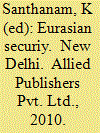

|
|
|
|
|
| Publication |
New Delhi, Allied publishers Pvt. Ltd., 2010.
|
| Description |
xx,159p.
|
| Standard Number |
9788184246414
|
|
|
|
|
|
|
|
|
|
|
|
Copies: C:1/I:0,R:0,Q:0
Circulation
| Accession# | Call# | Current Location | Status | Policy | Location |
| 056803 | 355.00958/SAN 056803 | Main | On Shelf | General | |
|
|
|
|
| 5 |
ID:
175845


|
|
|
|
|
| Summary/Abstract |
Although recent scholarship has advanced our understanding of status, little attention has been paid to the factors that shape states’ status-seeking behaviour. Consequently, existing theories are unable to explain why Russia has been more aggressive and confrontational in its status-seeking than China. What is missing is a detailed examination of the ways in which status-seekers’ power trajectories affect their status-seeking behaviour. Whether a status-seeker is rising or in decline shapes its propensity to take risks in pursuit of status, its calculations regarding the utility of attaining more status, and its ability to use non-confrontational and non-aggressive status-seeking strategies to induce other states to accord it higher status. Declining powers, such as Russia, engage in aggressive status-seeking to avoid imminent status losses. Decliners need to initiate confrontations with other states to compel them to recognise their status. Risers, such as China, are more cautious and restrained. Recognising that aggressive status-seeking can jeopardise imminent gains, they are conscious of the costs that accompany elevated status. Their admirable successes and growing power, moreover, make other states all the more willing to accord them higher status. Risers, therefore, can enhance their status without resorting to aggressive or confrontational methods.
|
|
|
|
|
|
|
|
|
|
|
|
|
|
|
|
| 6 |
ID:
140153


|
|
|
|
|
| Summary/Abstract |
Comparing the national interests of China and Russia is especially important today when the two countries are going through a period of rapid political rapprochement, where it is vital to have a clear understanding of the partner's logic. This article will try to analyze the foreign-policy strategies of the two countries and the attitudes of their elites to the contemporary international system through the prism of their national interests.
|
|
|
|
|
|
|
|
|
|
|
|
|
|
|
|
| 7 |
ID:
147735


|
|
|
|
|
| Summary/Abstract |
Cooperation and interaction between Russia and China, based on equitable and constructive partnership, over the past twenty years have become truly strategic and all-embracing, both rhetorically and practically. The formula "forever friends, never enemies" succinctly but vividly conveys the general political vision of what Russian-Chinese relations should be like now and in the future, and contains a kind of genotype of these relations.
|
|
|
|
|
|
|
|
|
|
|
|
|
|
|
|
| 8 |
ID:
174274


|
|
|
|
|
| Summary/Abstract |
The rules that underpin the international fight against corruption are barely 30 years old. Their foundations are the UN Convention Against Corruption (2003), the OECD Anti-Bribery Convention (1997) and a number of regional conventions. On top of this sit national and multilateral institutions, agencies and initiatives, buttressed by legislation such as France’s transparency and anti-corruption law, known as Loi Sapin II, the UK Bribery Act, Brazil’s Clean Companies Act and the US Foreign Corrupt Practices Act.
|
|
|
|
|
|
|
|
|
|
|
|
|
|
|
|
| 9 |
ID:
188145
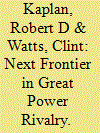

|
|
|
| 10 |
ID:
167883


|
|
|
|
|
| Summary/Abstract |
In this article, we investigate the European Union's (EU) role as a normative foreign policy actor and its troubled relations to Russia and China. We contend that the lack of preparedness of the EU to foresee the increasingly tense relations with these countries can be explained through a role theoretical perspective. We show that the attachment of the EU to its role as a normative international actor reduced its awareness of Russia's and China's growing refusal to accept the EU's ambition to diffuse liberal norms and principles. The EU's inability to read the changing role expectations of China and Russia hampered the shaping of an appropriate foreign policy leading up the diplomatic crises with these two countries in the late 2000s and early 2010s, respectively. Theoretically, the findings contribute with a novel understanding of role conceptions in terms of reducing an actor's preparedness to acknowledge changes to its international role position caused by challenges raised by antagonistic partners.
|
|
|
|
|
|
|
|
|
|
|
|
|
|
|
|
| 11 |
ID:
175210


|
|
|
|
|
| Summary/Abstract |
The record of the global nuclear nonproliferation regime has been impressive, defying dire predictions of a world with many nuclear-armed states. Since North Korea acquired nuclear weapons nearly 30 years ago, no additional country has done so. Many factors explain that positive record, but one of those factors has been the ability of the United States to work constructively with Russia and China from time to time in support of shared nonproliferation goals.
|
|
|
|
|
|
|
|
|
|
|
|
|
|
|
|
| 12 |
ID:
170638


|
|
|
|
|
| Summary/Abstract |
At 70, I follow all the desires of my heart without breaking any rules. ... Confucius ... This year, Russia and China mark a significant date - the 70th anniversary of the establishment of diplomatic relations. The People's Republic of China was set up on the first of October 1949, and the Soviet Union was the first to extend recognition to the young state. ... There have been different periods in the history of bilateral contacts, but today it can be confidently stated that the vector directed into the development of good-neighborly intercourse, friendly relations, and cooperation has become trend-setting
|
|
|
|
|
|
|
|
|
|
|
|
|
|
|
|
| 13 |
ID:
141797
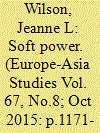

|
|
|
|
|
| Summary/Abstract |
This article compares soft power as a normative and operational construct in the Russian and Chinese political context. I examine Russian and Chinese discourse on soft power as well as the efforts of the Kremlin and Beijing to devise programmes for its implementation. I then compare and evaluate the similarities and differences in Russian and Chinese soft power strategy. The similarities between the two states indicate their joint status as authoritarian regimes with a Marxist–Leninist heritage. The differences can be attributed to their vastly disparate economic circumstances, but also to historical, social, and political factors that influence soft power policies.
|
|
|
|
|
|
|
|
|
|
|
|
|
|
|
|
| 14 |
ID:
189684


|
|
|
|
|
| Summary/Abstract |
China’s expanding nuclear arsenal, Russia’s invasion of Ukraine, and the looming expiration in 2026 of the last remaining U.S.-Russian strategic arms control agreement pose unprecedented challenges for U.S. nuclear policy and arms control. This evolving security landscape demands a fresh look at policies aimed at avoiding nuclear war and ensuring the security of the United States and its allies and partners.
|
|
|
|
|
|
|
|
|
|
|
|
|
|
|
|
| 15 |
ID:
163942
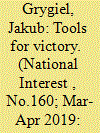

|
|
|
|
|
| Summary/Abstract |
The Trump administration’s foreign policy can be understood as driven by the recognition that choices are limited, and the last one—reforming the existing alliances—is the best bet.
|
|
|
|
|
|
|
|
|
|
|
|
|
|
|
|
| 16 |
ID:
163951
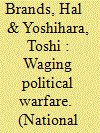

|
|
|
|
|
| Summary/Abstract |
Both Russia and China are governed by opaque, highly centralized and increasingly personalized governments that are well suited to the darker arts of statecraft. Political warfare, for such regimes, is second nature.
|
|
|
|
|
|
|
|
|
|
|
|
|
|
|
|
| 17 |
ID:
145939


|
|
|
|
|
| Summary/Abstract |
‘Who only England know’ – the words are of course Rudyard Kipling’s from his poem ‘The English Flag’. Kipling was a self-made Tory, not a toff or a paternalist, unlike the men who applied to join the EU, beginning with the unsuccessful bid by Harold Macmillan back in 1961. Kipling was a proto-Thatcherite who hated the deference shown to the trade unions by the liberal intelligentsia, the very notion that there was any common ground between socialism and Toryism. Like Margaret Thatcher, he was a populist who believed that salvation would come from ‘the people in the third- class carriages’. Like her, he quitted the third-class carriages for the embodiment of freedom, the motor car, and never travelled by rail again.
|
|
|
|
|
|
|
|
|
|
|
|
|
|
|
|
|
|
|
|
|